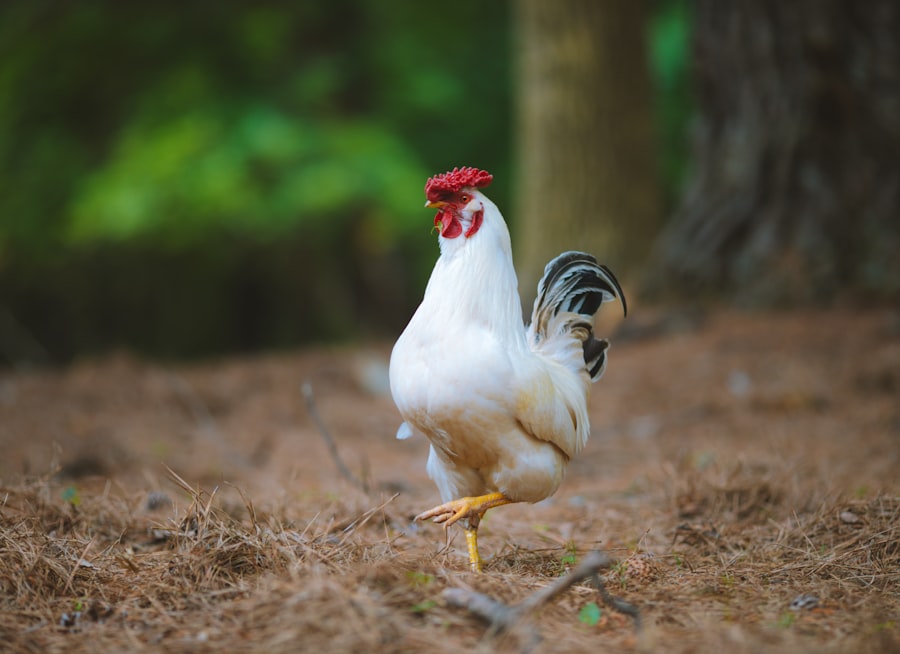Raccoons are notorious for their ability to wreak havoc on chicken coops and prey on unsuspecting chickens. As a chicken owner myself, I have experienced firsthand the devastation that raccoons can cause. It is not only heartbreaking to lose beloved chickens, but it can also be financially draining to constantly repair and reinforce the coop to keep these crafty creatures out.
Key Takeaways
- Raccoons target chickens because they are easy prey and a good source of food.
- A secure coop is essential to keeping raccoons out and protecting your flock.
- Choosing the right fencing material and height can help prevent raccoon attacks.
- Lighting and noise can be effective deterrents for nocturnal predators like raccoons.
- Removing food and water sources can help reduce the likelihood of raccoon encounters.
Understanding the Threat: Why Raccoons Target Chickens
Raccoons are highly intelligent and adaptable creatures. They are known for their dexterity and problem-solving skills, which make them formidable predators. Raccoons are primarily nocturnal animals, which means they are most active during the night when chickens are roosting and vulnerable.
There are several reasons why raccoons target chickens. Firstly, chickens provide a readily available source of food for raccoons. They are easy prey, especially if the coop is not properly secured. Additionally, raccoons are attracted to the smell of chicken feed and will go to great lengths to access it. Lastly, raccoons may also attack chickens for territorial reasons or out of curiosity.
The Importance of a Secure Coop: Keeping Raccoons Out
Having a secure coop is essential in keeping raccoons out and protecting your flock. A well-built coop not only prevents raccoons from entering but also provides a safe and comfortable environment for your chickens.
A secure coop has several benefits. Firstly, it ensures the safety of your chickens by keeping predators out. This reduces stress on the flock and allows them to thrive. Secondly, a secure coop prevents the spread of diseases by keeping wild animals away from your chickens. Lastly, it gives you peace of mind knowing that your chickens are safe and protected.
Common weaknesses in chicken coops include gaps in the walls or roof, weak or easily accessible doors, and inadequate flooring. It is important to regularly inspect and reinforce these areas to prevent raccoons from gaining entry. Additionally, make sure to use sturdy materials such as hardware cloth or welded wire mesh to cover any openings.
Fencing Options: Choosing the Right Material and Height
| Fencing Material | Pros | Cons | Height |
|---|---|---|---|
| Wood | Natural look, customizable, affordable | Requires maintenance, can rot or warp | 4-6 feet |
| Chain Link | Durable, low maintenance, affordable | Not very attractive, offers little privacy | 4-6 feet |
| Wrought Iron | Stylish, durable, low maintenance | Expensive, can rust over time | 4-6 feet |
| Vinyl | Durable, low maintenance, customizable | Can crack or fade over time | 4-6 feet |
| Bamboo | Natural look, eco-friendly, affordable | Not as durable as other materials | 6-8 feet |
Fencing is another crucial aspect of protecting your chickens from raccoons. There are various fencing materials available, each with its own advantages and disadvantages.
One popular option is chicken wire, which is affordable and easy to install. However, it is not the most effective at keeping raccoons out as they can easily tear through it. Hardware cloth or welded wire mesh, on the other hand, is much more secure and durable. It is important to choose a mesh size that is small enough to prevent raccoons from squeezing through.
When it comes to the height of the fence, it should be at least 4 feet tall to deter raccoons from climbing over. However, some raccoons are skilled climbers and can scale even higher fences. In such cases, adding an overhang or an electric wire at the top of the fence can be effective deterrents.
Lighting and Noise: Deterrents for Nocturnal Predators
Raccoons are nocturnal animals, which means they are most active during the night. Using lighting and noise can be effective deterrents to keep raccoons away from your chickens.
Bright lights can make raccoons feel exposed and vulnerable, discouraging them from approaching the coop. Motion-activated lights are particularly effective as they startle raccoons when they approach. Additionally, installing a timer on the lights can simulate natural daylight patterns and further discourage raccoon activity.
Noise can also be an effective deterrent for raccoons. Playing a radio or using a motion-activated sound device that emits predator calls can make raccoons think twice about approaching your coop. However, it is important to periodically change the sounds or patterns to prevent raccoons from becoming accustomed to them.
Food and Water Safety: Removing Temptation for Raccoons

Raccoons are attracted to the smell of chicken feed and will go to great lengths to access it. Therefore, it is important to store food and water in a way that is inaccessible to raccoons.
Store chicken feed in secure containers that raccoons cannot open or chew through. Metal or heavy-duty plastic containers with tight-fitting lids are ideal. Avoid leaving food out overnight, as this will attract raccoons and other pests.
Water spills and leaks can also attract raccoons, so it is important to prevent them. Use spill-proof waterers and regularly check for leaks in the coop or water supply system. Additionally, clean up any spilled food or water immediately to avoid attracting raccoons.
Natural Repellents: Using Plants and Scents to Keep Raccoons Away
There are several plants and scents that are known to repel raccoons. These natural repellents can be used in and around the coop to deter raccoons from approaching.
Plants such as marigolds, mint, and lavender have strong scents that raccoons find unpleasant. Planting these around the coop can help keep raccoons at bay. Additionally, placing mothballs or ammonia-soaked rags near potential entry points can also deter raccoons.
It is important to note that while these natural repellents can be effective, they may not provide foolproof protection. It is still crucial to have a secure coop and fencing in place as the primary defense against raccoons.
Trapping and Removal: When to Call in the Professionals
In some cases, trapping and removing raccoons may be necessary if they persistently target your chickens despite your best efforts. Signs that you may need professional help include repeated attacks on your flock, damage to the coop that cannot be easily repaired, or if you are unable to safely trap and remove raccoons yourself.
When seeking professional help, it is important to find a reputable wildlife removal service. Look for companies that are licensed and insured, and have experience in dealing with raccoon removal. They should use humane trapping methods and have a plan in place for relocating the raccoons to a suitable habitat.
Predators Beyond Raccoons: Protecting Your Flock from Other Threats
While raccoons are a common threat to chickens, there are other animals that may pose a danger as well. It is important to be aware of these predators and take steps to protect your flock.
Some common predators include foxes, coyotes, hawks, and snakes. To protect against ground predators, bury hardware cloth or welded wire mesh around the perimeter of the coop to prevent digging. Installing a secure roof or using netting can deter aerial predators.
Additionally, keeping the coop clean and free of debris can help prevent snakes from hiding and preying on your chickens. Regularly inspect the coop for any signs of damage or weakness that could provide entry points for predators.
The Importance of Regular Maintenance: Checking for Weaknesses in Your Defenses
Regular maintenance is crucial in keeping your chickens safe from raccoons and other predators. Over time, wear and tear can weaken the coop and fencing, making it easier for raccoons to gain entry.
Inspect the coop and fencing regularly for any signs of damage or weakness. Look for gaps in the walls or roof, loose or damaged doors, and any areas where raccoons could potentially squeeze through. Reinforce these areas promptly to prevent raccoon access.
Additionally, check the fencing for any signs of wear or damage. Replace any broken or bent wires and ensure that the fence is securely attached to the ground. Regularly trim any vegetation that may provide a bridge for raccoons to climb over the fence.
Educating Your Community: Encouraging Responsible Pet Ownership to Reduce Raccoon Encounters
Reducing raccoon encounters is not only beneficial for chicken owners but also for the raccoons themselves and the community as a whole. Educating your community about responsible pet ownership can help reduce the likelihood of raccoon attacks on chickens.
Organize community workshops or events to educate pet owners about the importance of keeping their pets indoors or in secure enclosures at night. Encourage them to properly dispose of garbage and food waste to avoid attracting raccoons. By working together, you can create a safer environment for both humans and wildlife.
Keeping Your Chickens Safe from Raccoons
In conclusion, protecting your chickens from raccoons requires a multi-faceted approach. A secure coop, proper fencing, lighting and noise deterrents, food and water safety measures, natural repellents, regular maintenance, and community education are all important aspects of keeping your flock safe.
By implementing these strategies, you can minimize the risk of raccoon attacks and create a safe and secure environment for your chickens. Remember, prevention is key, so it is important to be proactive in protecting your flock from raccoons and other predators.
If you’re looking for ways to protect your chickens from raccoons, check out this helpful article on poultrywizard.com. It provides valuable tips and strategies to keep raccoons away from your chickens and their coop. From securing the coop with a snaplock system to creating a predator-proof floor, this article covers various methods to ensure the safety of your feathered friends. Don’t let raccoons become a threat to your chickens; learn how to protect them with the advice in this informative article.
FAQs
What are raccoons?
Raccoons are medium-sized mammals native to North America. They are known for their distinctive black mask-like markings around their eyes and their ringed tails.
Why do raccoons attack chickens?
Raccoons are omnivores and will eat almost anything, including chickens. They are attracted to the smell of chickens and their eggs.
What are some signs that raccoons are attacking my chickens?
Signs of raccoon attacks on chickens include missing birds, feathers scattered around the coop, and damage to the coop or fencing.
How can I keep raccoons away from my chickens?
There are several ways to keep raccoons away from chickens, including securing the coop with sturdy fencing and locks, using motion-activated lights or sprinklers, and removing any potential food sources from the area.
What should I do if I find a raccoon in my chicken coop?
If you find a raccoon in your chicken coop, do not approach it. Call a professional wildlife removal service to safely remove the raccoon from your property.
Are raccoons dangerous to humans?
Raccoons can carry diseases such as rabies and can be aggressive if they feel threatened. It is important to avoid contact with raccoons and to seek medical attention if you are bitten or scratched by one.
Meet Walter, the feathered-friend fanatic of Florida! Nestled in the sunshine state, Walter struts through life with his feathered companions, clucking his way to happiness. With a coop that’s fancier than a five-star hotel, he’s the Don Juan of the chicken world. When he’s not teaching his hens to do the cha-cha, you’ll find him in a heated debate with his prized rooster, Sir Clucks-a-Lot. Walter’s poultry passion is no yolk; he’s the sunny-side-up guy you never knew you needed in your flock of friends!







